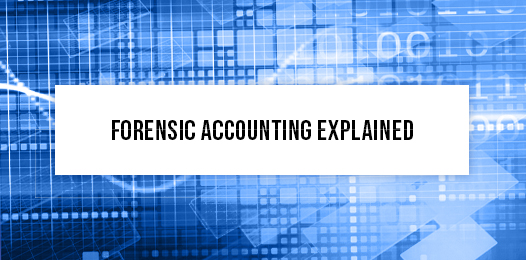
Hiding millions of dollars in failed projects and debt.
Inflating stock prices and debt ratings.
Misrepresenting financial records and deceiving stakeholders.
These are just a few of the “creative accounting” techniques the Enron Corporation reportedly used before its financial misdeeds were exposed in 2001. The scandal rocked Wall Street and when all was said and done, Enron’s stock plummeted from a high of $90.75 to a low of $0.26 per share.
And just who are the heroes of this story that uncovered the truth? It was the forensic accountants from the Securities and Exchange Commission (SEC). Through careful review of Enron’s financial statements, these intrepid financial investigators were able to uncover fake holdings, off-the-books accounting, and other abuses.
In this blog, we’ll provide a high-level overview of just what forensic accounting is and why forensic accountants can be invaluable in rooting out financial anomalies in organizations big and small, across industries far and wide.
Forensic Accounting Defined
Whether you’re looking at a huge case like Enron or a case involving embezzlement of funds in a small business, financial conflict can feel like being in a long, dark, ominous tunnel. Lawyers are usually involved and pitted against each other at either end, in an expensive and time-consuming battle, attempting to prove their client’s side of the story as the only existing truth. Forensic accountants are relied upon to shed light on the myriad of financial details, facts, and numbers.
Time becomes the essential resource in providing astute financial measurements and conclusions. Forensic accounting includes a great deal of investigation. The term forensic accounting was first coined in 1946 and described the role of the accountant as using “financial knowledge, technology, and techniques to provide information presentable to a court of law.” The Forensic CPA Society now defines forensic accounting as, “the specialty practice area of accounting that describes engagements that result from actual or anticipated disputes or litigation.” As such, “suitable for use in Court” is the standard and potential outcome that forensic accountants generally work to achieve.
What’s the difference between a typical accountant and a forensic accountant?
Well-known accounting functions include bookkeeping, preparing tax filings, and auditing. Forensic accounting is the space in between — utilizing and blending subject matter expertise within these practice areas and applying them to various case files.
In a world of claimants, plaintiffs, defendants, and criminals, forensic accountants are held to high standards, expected to be independently objective, ask insightful questions, gather and inspect evidence, perform substantive testing and analytical procedures on that evidence, and ultimately determine the actual truth by providing a logical and accurate picture and quantification with respect to the amount in question.
What are the core services forensic accountants typically provide?
At the heart of forensics is delivering complex financial information in a clear and concise manner. While the specific services may vary from firm to firm, generally speaking, forensic accountants can offer the following types of services:
- financial investigations, including evidence gathering
- financial and data analysis
- litigation services
- review of relevant economic issues
- expert testimony
- administrative support
What types of cases do forensic accountants handle?
Forensic accountants scrutinize financial discrepancies in cases spanning a range of scenarios, including:
- analyzing and validating insurance claims for settlement
- documenting financial impact from cybercrime, product liability, or environmental disasters
- quantifying economic damages from embezzlement, business interruption, or personal injury
- investigating instances of fraud, including financial statement misrepresentation and asset misappropriation
- analyzing business disputes, for example, breach of contract or merger and acquisition misrepresentation cases, to quantify financial impact
- valuating interests in business entities, pensions, intellectual properties, and other assets
- assessing the impact of wide-area damages
- working to document and recover crime proceeds or locate missing funds
- assessing specie market inventory movement (e.g., cargo, jewelry, art)
- tracing and valuing assets in matrimonial disputes and dissolutions
- scrutinizing cases of professional negligence
- facilitating bankruptcies, insolvency, and reorganization
How do forensic accountants conduct investigations?
Forensic accountants are skilled at asking insightful questions, gathering and inspecting evidence, performing substantive testing and analytical procedures on that evidence, and ultimately providing an accurate, logical picture, and quantification of the amounts in question. Evidence gathering may include examining journal entries, reviewing business records, deciphering local statutes and economic factors, analyzing historical trends, tracing the flow of funds, and looking for irregularities.
Depending on who the client is (e.g., an insurance company, policyholder, corporation, etc.), they will use that data analysis to prepare reports on their findings that will stand up in a court of law. They also regularly provide litigation services to clients such as helping develop questions for witnesses, countering findings from opposing counsel, and providing expert testimony.
In some cases, forensic accountants work with internal accounting staff to implement controls to reduce fraud exposure or other risks moving forward.
Numbers tell a story and the professionals at Lowers Forensics International can help simplify the complicated, sift through voluminous data with swift efficiency, and carefully analyze the details, facts, and circumstances surrounding the issues at hand. The technologies Lowers Risk Group has developed and continues to develop, will not only revolutionize the forensic accounting space, but will give us a significant value proposition for our clients. If you think a forensic accounting expert may be of assistance to your organization, contact us to discuss.